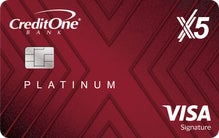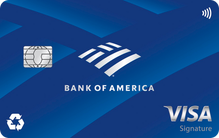Best Visa credit cards for February 2026
Advertiser Disclosure: Bankrate’s editorial team chooses and recommends the credit cards on this page. Our websites may earn compensation when a customer clicks on a link, when an application is approved, or when an account is opened. However, our recommendations and card ratings are produced independently without influence by advertising partnerships with issuers.
Filter by
Showing 5 results
Best starter travel card
on Chase's secure site
See Rates & FeesIntro offer
75,000 bonus points
Rewards rate
1x - 5x
Annual fee
$95
Regular APR
19.24% - 27.49% Variable
Why you'll like this: It’s an especially versatile rewards card, offering practical bonus categories and flexible, high-value points.
Reward Details
What you should know
Card Details
Best for luxury travel perks
on Chase's secure site
See Rates & FeesIntro offer
125,000 bonus points
Rewards rate
1x - 8x
Annual fee
$795
Regular APR
19.49% - 27.99% Variable
Why you'll like this: Its best-in-class travel perks are some of the best on the market.
Reward Details
What you should know
Card Details
Best for low interest & fees
on Upgrade's secure site
See Rates & FeesIntro offer
$200
Rewards Rate
1.5%
Annual fee
$0
Regular APR
14.99% - 29.99%
Why you'll like this: You’ll get a chance at one of the lowest ongoing APRs on the market without sacrificing rewards.
Reward Details
What you should know
Card Details
Best for fair credit scores
on Credit One Bank's secure site
See Rates & FeesIntro offer
N/A
Rewards Rate
1% - 5%
Annual fee
$95
Regular APR
29.74%* Variable
Why you'll like this: It’s one of the few cards available with fair credit that offers a high reward rate in multiple everyday spending categories.
Reward Details
What you should know
Card Details
Best for occasional travelers
Intro offer
25,000 points
Rewards rate
1.5X - 3X
Annual fee
$0
Regular APR
17.49% - 27.49% Variable APR on purchases and balance transfers
Why you'll like this: You can redeem points as a statement credit for both travel and dining purchases — even purchases nearly a year old.
Reward Details
What you should know
Card Details
Remove a card to add another to compare
Remove a card to add another to compare
Compare Bankrate's top Visa credit cards of 2025
| Card name | Best for | Bankrate review score |
|---|---|---|
|
Best starter travel card |
4.9 / 5 Our writers, editors and industry experts score credit cards based on a variety of factors including card features, bonus offers and independent research. Credit card issuers have no say or influence on how we rate cards.
Apply now
on Chase's secure site
|
|
|
Luxury travel perks |
4.8 / 5 Our writers, editors and industry experts score credit cards based on a variety of factors including card features, bonus offers and independent research. Credit card issuers have no say or influence on how we rate cards.
Apply now
on Chase's secure site
|
|
|
Low interest & fees |
4.2 / 5 Our writers, editors and industry experts score credit cards based on a variety of factors including card features, bonus offers and independent research. Credit card issuers have no say or influence on how we rate cards.
Apply now
on Upgrade's secure site
|
|
|
Fair credit scores |
3.8 / 5 Our writers, editors and industry experts score credit cards based on a variety of factors including card features, bonus offers and independent research. Credit card issuers have no say or influence on how we rate cards.
Apply now
on Credit One Bank's secure site
|
|
|
Occasional travelers |
4.3 / 5 Our writers, editors and industry experts score credit cards based on a variety of factors including card features, bonus offers and independent research. Credit card issuers have no say or influence on how we rate cards.
Apply now
on Bank of America's secure site
|
Researching the best Visa credit cards
We thoroughly rate and research the best Visa cards based on key criteria to help you make confident decisions when choosing your next credit card. Learn more about our methodology below.
What to know about Visa credit cards
Several credit card issuers and banks use the Visa payment network. Networks like Visa, along with Discover, American Express and Mastercard, facilitate electronic transactions of funds between buyers and sellers. They generally charge a small fee for each transaction.
While Visa technically acts as the facilitator for all payments made with a Visa credit card, it is not a credit card issuer or bank. It simply provides the technology that credit card issuers and banks use for Visa cards.
Visa is at the top of the payment processing industry as the largest of the four major U.S. credit card networks. If you have a debit, credit or prepaid card in your wallet, there's a good chance that the card is partnered with Visa.
With over 1 billion credit cards in circulation worldwide (an estimated 798 million outside the U.S.), Visa's international presence is undeniable. Visa cards are accepted in more than 200 countries and can be used with more than 10 million merchants in the United States. In the first three quarters of 2022, Visa's worldwide credit payments were more than $2 trillion, according to Bankrate.com Market Share Statistics.
Visa credit card benefit tiers
All Visa cards fall under one of three benefit tiers: Traditional, Signature and Infinite. Each card tier offers different benefits, but your card issuer will determine the exact benefits that come with your card.
It’s worth checking the terms and conditions of any Visa card you’re considering to see what protections and benefits it includes. While Visa designates benefit tiers and includes a list of perks available in each tier, not every card issuer offers those benefits. For instance, you may carry a Visa Signature card, but whether that card comes with all Visa Signature benefits will be at the discretion of your card issuer — not Visa.
Visa credit card pros and cons
Pros
-
Worldwide acceptance: Visa cards are accepted in over 200 countries and territories, making it one of the most widely accepted payment networks in the world.
-
Travel benefits: The Visa benefit tiers feature an array of travel-related perks ranging from roadside dispatch at the lowest tier to lost luggage reimbursement at the highest tier.
-
Straightforward benefit tiers: Clearly defined tiers make understanding benefits a bit easier, though you’ll have to carefully review the specific benefits that come with your card.
Cons
-
High annual fees on certain cards: Visa cards can come with annual fees ranging from $35 to over $500. Plenty of Visa cards don’t charge an annual fee, though the reward offers on those cards may not be as luxurious.
-
More focus on travel protection, less on discounts/experience: Competitors like Mastercard feature travel experience benefits like airport concierge service, a feature that isn’t offered at Visa Signature or Infinite tiers.
What people say about Visa credit cards
Finding the right Visa card for you is like scrolling through Uber Eats or Grubhub—there are a lot of options but nothing sounds perfect.
People often turn to public forums like r/Creditcards and myFICO to get more opinions on the best credit options for them. Visa cards are some of the most talked about, yet, the network itself is rarely discussed in detail because their card’s strengths typically steal the show.
Prompted to answer what their favorite Visa card is, one user comments it’s “the Amazon Prime Visa. Uncapped 5% back at a store where you can buy just about anything non-grocery, at a competitive price? Yeah sign me up.”
Beyond the mention of specific cards, other users praise Visa cards’ overall flexibility when it comes to international travel. In reply to a query looking for the best card for international travel, a r/CreditCards user comments, “cards with no foreign transaction fees to consider are the Redstone FCU Visa Signature, Wells Fargo Autograph, U.S. Bank Altitude Go, and SoFi Credit Card.”
Overall, you shouldn’t fixate on payment network, issuer or card type without a practical reason. A myFICO user says it best: “Find the products that actually benefit you and make a plan to get those. Don't chase products you don't actually need.”
How popular are the best Visa cards?
According to our data, Visa cards on this page received a combined total of over 21,000 applications in 2023, suggesting that Visa has partnered with a number of popular card issuers.
That said, the vast majority of applicants applied for these cards via a different “Best of” page (like Best Credit Cards, Best Cash Back Cards and the like). This suggests that very few people are specifically seeking a Visa credit card — Visa just so happens to be the payment network associated with the cards they want, and their choice of card is based not on its payment network, but its rewards, perks, cost and other details.
Who should get a Visa card?
Choosing a Visa credit card is the same as choosing the best card from any credit card network. You should find the one that best suits your overall financial situation. Knowing your goals and how your spending aligns with the following profiles will help you gauge which Visa card is right for you:
If you aren’t sure where to start with your search for a Visa credit card, consider looking at Visa Signature cards. This mid-level Visa tier includes cards that come with a handful of solid perks and usually have fairly decent rewards rates. If you can familiarize yourself with Visa Signature cards, you can determine if they’re enough to meet your needs or if you need to consider Visa Traditional or Infinite cards.
Still unsure if a Visa credit card is right for you? Check out our CardMatch tool to get personalized credit card recommendations and prequalification offers based on your credit score, spending habits and daily needs.
Expert advice for Visa cards
Visa credit cards are worth considering because they’re part of the most prevalent credit card network available and can have valuable benefits. Merchants almost anywhere in the world will be able to accept payments with a Visa credit card. Since the Visa network includes many credit card types, it should also be easy to find a Visa card you can make the most of.
Here are some tips to keep in mind when you’re looking for your next Visa card or hoping to maximize one you hold:
-
Earn your welcome offer
The best Visa cards carry valuable welcome offers that bring a lot of value to your first year with your new card. Use your card whenever possible in your first few months to meet any spending requirement attached to your sign-up bonus. It may be tempting to spend in excess, so plan your purchases ahead of time to avoid spending beyond your means. If you overspend chasing a welcome offer and end up carrying a balance, the interest charges could negate rewards.
-
Check card acceptance
Visa may be the largest of the credit card networks with the widest acceptance rate, but you might run into a merchant that won’t take Visa cards. If this is the case, they might not take any credit cards. However, it pays to remain aware so you aren’t left stunned in the checkout process.
Bankrate Insight
U.S Costco warehouse locations and U.S Costco gas stations exclusively accept Visa cards.
-
Maximize your rewards categories
Visa cards include several reward categories across many cards. You should know where and in which categories your card(s) earn the most points, cash back or miles when you’re maximizing rewards categories. It can help to calculate how much you’ll spend in a given month, quarter or year in each of your spending categories when thinking about how you’ll use a credit card.
Like with any card, you should avoid spending for the sake of earning rewards or cash back.
-
Be aware of rates and fees
Some of the most common credit card fees to watch for include annual fees, late payment fees, foreign transaction fees and balance transfer fees. And while you should strive to avoid carrying a balance, you’ll want a low ongoing APR if you anticipate not paying your balance in full.
*For Capital One products listed on this page, some of the above benefits are provided by Visa® or Mastercard® and may vary by product. See the respective Guide to Benefits for details, as terms and exclusions apply.
Frequently asked questions about Visa credit cards
How we assess the best Visa credit cards
When evaluating the best Visa credit cards, we take into account several factors, including how cards score in our proprietary card rating system and whether they offer features that fit the priorities of a diverse group of cardholders, from earning rewards to scoring a large sign-up bonus to saving on interest.
Our rating database covers over 250 of the most popular credit cards, allowing us to compare the quality of various Visa cards to each other and to cards in the same category that use different credit card networks.
We scored each card based on the factors most relevant to its primary category, including its rewards rate, estimated annual earnings, intro APR period, ongoing APR, perks and more to determine whether it belonged in this month’s roundup.
Here’s a look at how our card ratings are distributed as of August 2024, as well as some of the key factors that we considered in selecting this month’s best Visa cards.
-
5 stars 2%
-
4 - 4.9 stars 35%
-
3 - 3.9 stars 39%
-
2 - 2.9 stars 22%
-
1 - 1.9 stars 2%









